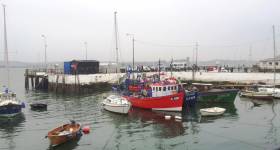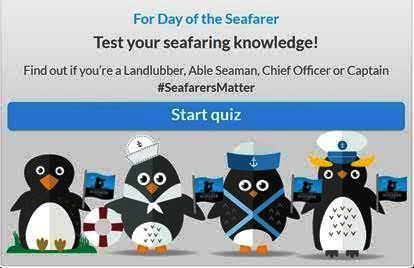Displaying items by tag: seafarer
‘Realising Ireland’s Maritime Ambition’ - NMCI’s Seafarer’s Conference 2024 is Announced
The National Maritime College of Ireland (NMCI) has announced its third annual Seafarers’ Conference, ‘Realising Ireland’s Maritime Ambition’, which will take place on 22 February 2024 in the Castletroy Park Hotel in Co. Limerick.
The conference, sponsored by Simply Blue Group, will bring together representatives from Government Departments, maritime industry, supply chain workforce, and training & education institutions both nationally and internationally to explore the opportunities to support and grow the fishing and offshore wind industries in Ireland. Considering the climate crisis, Ireland’s ambition for offshore renewable energy is large. Equally, considering the biodiversity crisis and the importance of food security, the ambition for sustainable fishing and seafood is of central importance to Ireland’s coastal communities and beyond. As humankind looks seaward for solutions the necessity to plot a coexistent future at sea is of central importance. Ireland will need to prepare its maritime industry’s capability and capacity beyond anything that it has achieved to date if it is to realise its ambition.
Panel chairs Captain Brian Fitzgerald, Director of External Affairs and Stakeholder Liaison, Simply Blue Group; Commander Roberta O’Brien, Associate Head of College, NMCI; Paul Hegarty, Head of College, NMCI; and Peter Coyle, Chair Marine Renewable Industry Association will lead discussions on topics such as Enabling Ireland's Offshore Renewable Energy Ambition; Enabling Ireland's Fishing Industry Ambition; The International Experience of Meeting Maritime Ambition; and What Will Success Look Like in ten years’ time - 2034; with contributions from a broad range of leading experts on each topic, followed by individual presentations.
Speaking at the announcement of the 2024 conference, Niall Collins T.D., Minister of State at the Department of Further and Higher Education, Research, Innovation and Science said: “Ireland needs to support and generate employment in our offshore industries, ensuring that our vitally important sustainable seafood industry thrives in parallel with meeting climate action targets from the development of offshore renewable energies, protecting biodiversity in our oceans, and delivering suitable further and higher education programmes, while supporting and enhancing the skills needed to promote these sectors. The annual NMCI Seafarers’ Conference is an ideal platform for sharing ideas and practical solutions to help these sectors grow and thrive.”
Paul Hegarty, Head of College, NMCI commented: “The National Maritime College of Ireland is delighted to once again host Ireland's maritime stakeholders to our third annual Seafarers' Conference at Limerick. The provision of maritime education and training will be a central plank in Ireland's ability to realise its maritime ambition. I very much look forward to welcoming participants in person and online and once again to engaging in conversations around our shared maritime future on this island nation.”
Captain Brian Fitzgerald, Director of External Affairs and Stakeholder Liaison, Simply Blue Group, said: “The NMCI Seafarers’ Conference is an important forum for coming together and encouraging open, expert discussion on the challenges and opportunities for the fishing industry, the offshore renewable energy industry and relevant Government Departments with a view to plotting the way forward to a sustainable and coexistent future.”
National Seafarer Wellness Conference - To Address Human Factors in the Maritime Industry
A "Seafarer Wellness" conference will be held in the National Maritime College of Ireland (NMCI) on Friday 7th October 2022, to address human factors in the maritime industry.
The conference, organised by the Department of Maritime Studies NMCI/MTU, the Irish Institute of Master Mariners and the Nautical Institute, is the first of its kind to be held in Ireland and will set a baseline for the future.
Over 1.5 million seafarers play a vital part in the supply chain, keeping national and international economies operational during the pandemic.
Food, fuel, and everyday goods are transported in thousands of ships worldwide around the clock. There is little room for error which could result in loss of life, injury, pollution and delays. The maritime industry is safety critical and depends on professional people to minimise incidents, including accidents caused by human error.
Leading experts in the area, including medical professionals, psychologists, researchers and professional seafarers, will give presentations, generate discussion, debate and suggest solutions to address the human factors that influence life on board ships.
Topics such as resilience, diet, nutrition, fitness, stress, fatigue and psychosocial aspects will be presented. Maritime stakeholders, medical professionals and anyone interested in human factors will find the conference informative.
Tickets are available at the following Eventbrite link
Government Ignores United Nations Honouring of Seafarers
On my PODCAST this week I am dealing with three particular subjects – the Government’s lack of interest in the United Nations honouring of seafarers this Sunday; concern in coastal communities from where there are claims that senior officials in the Department of the Marine have threatened fishermen that another cut in the size of the Irish fishing fleet will be forced upon them, with or without their agreement – and water shortages on West of Ireland offshore islands caused, their community representative association claims, by a quarter-century of neglect of the needs of these communities to enable them to continue living on the islands.
The International Maritime Organisation, which is the United Nations body for the sea, of which Ireland is a member, has not listed Ireland as officially marking Sunday next, June 25, as INTERNATIONAL DAY OF THE SEAFARER, with the theme “SEAFARERS MATTER.” It is to be hoped that there will be individual efforts to remember the seafarers but it is a poor example by the State that an island nation, dependent for 95 per cent of its exports and imports on ships, shipping and seafarers, cannot officially run at least one national day in the year to show appreciation for seafarers. We will be pleased at AFLOAT to hear of events anywhere around Ireland.
There is a lot of concern in coastal communities about the future of the fishing industry amid fears that the Government is trying to force through another reduction in the Irish fleet, by cutting the number of boats to satisfy EU pressure, which gives a vastly bigger entitlement to catch fish in Irish waters to the bigger EU nations than Irish boats can catch in our own waters. That’s an issue I took up with the Minster for the Marine, Michael Creed, when I asked him if the Government is giving enough priority to maritime matters.
You can hear his response on the PODCAST below:

























































